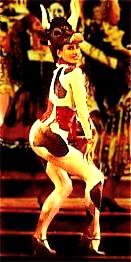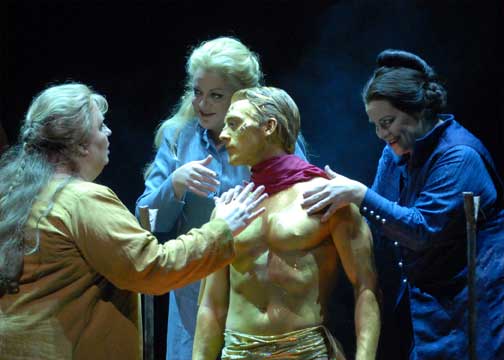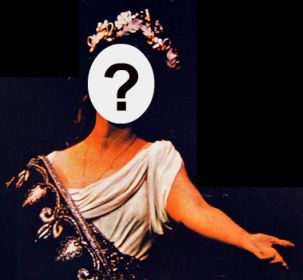
La Cieca has just learned the scheduled roster and repertoire for the
Volpe Farewell Gala to be performed on Saturday, May 20 (and, if all this music stays in the show, part of May 21 as well.)
Deborah Voigt will open the program with special material by
Ben Moore, accompanied by
Brian Zeger. The first of the
James Levine stand-ins,
Valery Gergiev, will then conduct selections from
Ruslan and Ludmilla and
Tannhaeuser. (Further baton duties for the evening are shared among
Marco Armiliato,
James Conlon,
Plácido Domingo,
Peter Schneider and
Patrick Summers.)
The first operatic solo of the evening ("La speranza" from
Semiramide) goes to
Juan Diego Florez. Further highlights of the first half include a duet from
L'italiana in Algeri (
Ildar Abdrazakov,
Olga Borodina), "O mio babbino caro" (
Ruth Anne Swenson), "Una furtiva lagrima" (
Ramon Vargas), "Ah non credea mirarti" (
Natalie Dessay), the Count's aria from
Figaro (
Dwayne Croft), "Can't Help Lovin' Dat Man" (
Denyce Graves), "Tacea la notte" (
Renee Fleming [!]), "Je vais mourir" from
Les Troyens (Waltraud Meier), the Prize Song (
Ben Heppner), and Marietta's Lied (
Kiri te Kanawa[!!]).
Frederica von Stade, Salvatore Licitra and Domingo (who sings, too!) will also perform a few songs in this segment, and after a "gala film" is shown, la Voigt will return to perform "Pace, pace."
Susan Graham is first on after intermission with another Moore ditty, followed by
Stephanie Blythe ("Ah, que j’aimes les militaires"), Thomas Hampson (Pierrot's song from
Die Tote Stadt),
Samuel Ramey (Mephisto's serenade from
Faust),
Dimitri Hvorostovsky and
Rene Pape in arias from
Don Carlo, and the double-barrelled mezzo excitement of
Dolora Zajick's "O mon Fernand" and Ms. Meier's Easter Hymn from
Cavalleria.
Two numbers from
Così fan tutte follow: "Ah guarda sorella" with Mmes. von Stade and te Kanawa, and "Soave sia il vento" with Fleming, Graham and Hampson. The baritone returns with
Karita Mattila for selections from
The Merry Widow, and then the audience will take a well-deserved bathroom break while the Met Ballet performs a jolly polka. (UPDATE: further clues suggest that this number will accompany an "open" scene change, so the audience will finally learn the meaning of all that yelling and banging that goes on while we sit in semidarkness for ten minutes at a stretch. It's important that we see this now, because that spoilsport
Peter Gelb has vowed to use some sort of voodoo "technology" to facilitate instantaneous scene changes, the way they do on Broadway, at the NYCO, in every European opera house, and, well, basically everywhere in the universe besides the Met.)
James Morris will then lead the Gods into Valhalla, and
Susan Graham will bid us all farewell with "Parto, parto." But wait, the show's not over yet. In what might best be called the "TBA Segment," we will (or perhaps will
not) hear tenors
Roberto Alagna and
Marcello Giordani in arias from
Cyrano de Bergerac and
La gioconda respectively. The legendary
Mirella Freni is penciled in for an aria from Alfano's
Risurezzione and a Puccini song, and then comes an item listed merely as "(34.
L. Pavarotti)."
Returning to the scheduled program, Mattila, Heppner, Pape, Morris (and
Matthew Polenzani) bring the curtain down with the finale to
Fidelio under the baton of Maestro Schneider.
At this point, La Cieca assumes,
Rudy Giuliani will present Volpe with a plaque or something and perhaps make a joke about how he's expecting Joe to be on time for work. And then The Beautiful Voice will be heard once more asking the musical question "When I Have Sung My Songs."
Labels: alagna, dessay, fleming, florez, gala, gelb, giordani, levine, met, nyco, pav, voigt


 La Cieca was just wondering about something yesterday on
La Cieca was just wondering about something yesterday on  This will be the first series of broadcasts from the Lyric Opera since the 2001- 2002 season, and LOC is kicking off the new broadcasts with a bang -- the opening night of Salome, featuring Deborah Voigt's first staged performance of the title role. The live broadcast will be on WFMT, 98.7 starting at 7:30 PM Central Time, and La Cieca has just learned that the broadcast will be streamed live over
This will be the first series of broadcasts from the Lyric Opera since the 2001- 2002 season, and LOC is kicking off the new broadcasts with a bang -- the opening night of Salome, featuring Deborah Voigt's first staged performance of the title role. The live broadcast will be on WFMT, 98.7 starting at 7:30 PM Central Time, and La Cieca has just learned that the broadcast will be streamed live over  La Cieca has just learned the scheduled roster and repertoire for the
La Cieca has just learned the scheduled roster and repertoire for the 










